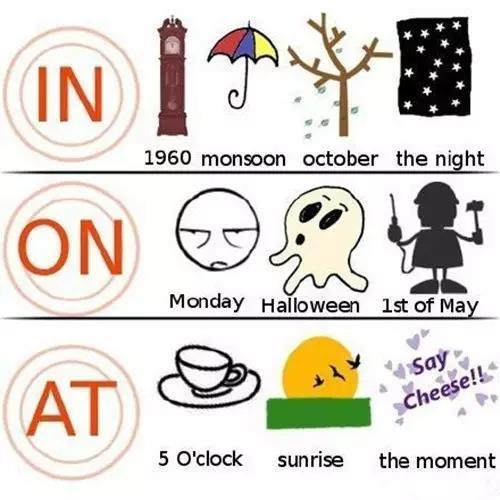
范文一:时间前的介词
时间名词前的介词
1. in
① in 常可以表示一天内的某一部分,如:in the morning/ afternoon/ evening/ night 但若具体指某一天的上午下午或晚上则介词改为on
He left on a cold Monday morning.
He was born on the night of September 9.
② in 加时间段表示在某段时间之后,常可表将来。如in a few minutes/ hours/ days/months/ years
It will be ready in a week’s time.
I will be back in a few days.
③ 在讨论月份,季节,年份,世纪是常用in
In (the )spring; in March; in 1980; in the twentieth century; 在20世纪80年代)(注:若说在某人几十岁时用one ’s, 如:他三十多岁了。)
2. on
① 表示在具体的某一天,或在具体的某天的上午下午晚上
On Monday/ on May 10th / on a cold morning
② 表示节日的具体的一天
Mr li received a card on Teachers’ Day.
He invited me to a dance after the show on Christmas Eve.(2009陕西)
注:on Christmas Eve在圣诞节前夕(指具体的一天)
On Christmas Day在圣诞节那一天(指12月25日)
at Christmas在圣诞节(指整个节假日而不只是一天)
③ on 后加名词或Ving 表示“一。。。。就。。。”
On his arrival/ On arriving in Beijing, Tom called up his friend.
3. at
① 常用在时间点前,午夜黄昏黎明
at two o’clock; at dawn; at dusk; at night; at midnight
at the end of the week(在周末)
②at the weekend(但也可说on the weekend)
at Christmas在圣诞节(指整个节假日而不只是一天)
4. for
① 加时间段说明前面动作延续的时间(动词需是延续性的) ,常和现在完成时或完成进行时连用,但亦要根据语境灵活运用。 They have been married for two years.
②for 加时间段常考时态,并且要注意since by等的相似与不同之处
区分下面句子:
I have been living here for two years.
I have been living here since two years ago.
I have been living here since I was born.
总结:Since 其后加时间点或具有时间点的句子而for 加的是时间段
★ She has lived such a life in/ for/ during/ over the past/ last two years.
★ She lived a hard life in the past.
总结:in/ for/ during/ over the past/ last加时间段,句子常和现在完成时相连 若只有in the past,则句子常和过去时相连
5. by
到。。。为止, 不迟于,
①后接表示过去的时间状语时常和过去完成时相连;接now 等现在的时间状语时和现在完成时相连;接将来的时间状语时和将来完成时相连
They had finished their work by the end of last week.
She has finished her work by now.
--Tom is planning to buy a car.
--I know. By next month, he will have saved enough for a used one.(2011江苏) ② 表示“在。。。情况下,在。。。时间”
Do you prefer to travel by day or by night? 你喜欢在白天还是夜晚旅游?
(by day 和in the day都可以表示在白天)
④ 加the 再加时间名词表示按。。计算
I’m paid by the hour/ day/ year.
范文二:时间前的介词
at表示时间的一点,in表示一个时期,on表示特殊日子。如,
He goes to school at seven o”clock in the morning. 他早晨七点上学。
Can you finish the work in two days. Can you finish the work in two days.你能在两天内完成这个工作吗,
Linda was born on the second of May. Linda was born on the second of May.琳达五月二日出生。
1. at后常接几点几分,天明,中午,日出,日落,开始等。如,
at five o”clock ,五点,
at down ,黎明,
at daybreak ,天亮,
at sunrise ,日出,
at noon ,中午,
at sunset ,日落,
at midnight ,半夜,
at the beginning of the month ,月初,
at that time ,那时,
at that moment ,那会儿,
at this time of day ,在一天的这个时候,。
2. in后常接年,月,日期,上午,下午,晚上,白天,季节,世纪等。如,
in 2006,2006年,
in May,2004 ,2004年五月,
in the morning ,早晨/上午,
in the afternoon ,下午,
in the evening ,晚上,
in the night ,夜晚,
in the daytime ,白天,
in the 21st century ,21世纪,
in three days ,weeks/month,三天,周/个月, in a week ,一周,
in spring ,春季,。
3.on后常接某日,星期几,某日或某周日的朝夕,节日等。如,
on Sunday ,星期日,
on a warm morning in April ,四月的一个温暖的上午, on a December night ,12月的一个夜晚, on that afternoon ,那天下午,
on the following night ,下一个晚上, on Christmas afternoon ,圣诞节下午, on October 1,1949 ,1949年10月1日, on New Year”s Day ,新年,
on New Year”s Eve ,除夕,
范文三:时间前的介词
时间前的介词
1(—What time did you get there this morning?
—______eight(
A(In B(On C(At D(From(2003北京市)
2(We traveled overnight to Paris and arrived______5 o’clockthe
morning(
A(on,in B(at,in C(at,on D(in,on(2003山西省)
3(Mary is flying to France soon( She will arrive______Paris______the morning of July 9(
A(in,onB(at,inC(in,in D(at,on(2003广州市)
4(—When will Mr(Black come to Beijng? —_____September 5(
A(On B(To C(At D(In(2004北京市)
5(The twins were born______a Friday evening(
A(in B(at C(on D(of(2004吉林省)
6(We went to the country______a very cold morning(
A(at B(in C(on(2004武汉市)
7(My father will be back from Beijing______a week(
A(for B(in C(after(2004四川省)
8(—How old are you? —I’m fifteen( I was born______1990(
A(in B(at C(on D(for(2005北京市)
9(The accident happened______a cold winter morning(
A(in B(on C(at D(of(2005陕西省)
10(I will meet my best friend______the morning of May 1st(
A(in B(on C(at(2005青海省)
11(I was born______July 2,and my birthday is coming soon(
A(on B(in C(at D(from(2005常德市)
12(______8?00 of August 8,2008,Beijing will hold the 29th
Olympic Games(
A(At B(In C(On D(By(2005甘肃省)
用于时间前的介词|初中英语知识点
Key:1(C 2(B 3(A 4(A 5(C 6(C 7(B 8(A 9(B 10(B 11(A 12(A
范文四:时间前介词的用法
时间名词前所用介词的速记歌
年月周前要用in,日子前面却不行。
遇到几号要用on,上午下午又是in。
要说某日上下午,用on换in才能行。
午夜黄昏须用at,黎明用它也不错。
at也用在明分前,说“差”可要用上to,
说“过”只可使用past,多说多练牢牢记,
莫让岁月空蹉跎。
下面就时间概念的介词用法做一简要介绍和比较。
1(at表示时间概念的某一个点。(在某时刻、时间、阶段等)。
at 1:00(dawn,midnight,noon)在一点钟(黎明、午夜、中午)
these are our chief tasks at the present stage(这些就是我们现阶段的主要任务。
2(on
1)表示具体日期。
they arrived in shanghai on may
25(他们在五月二十五日到达上海。
注:(1)关于"在周末"的几种表示法:
at(on)the weekend在周末---特指
at(on)weekends在周末---泛指
over the weekend在整个周末
during the weekend在周末期间
(2)在圣诞节,应说"at christmas而不说"on christmas
2)在(刚??)的时候。
on reaching the city he called up his parents(一到城里他就给父母打了一个电话。
3(in
1)表示"时段"、"时期",在多数情况下可以和dur- ing互换,前者强调对比,后者强调持续。 in(during)1988(december,the 20th century)在一九八八年(十二月、二十世纪)
i returned to beijing in the middle of june(我是六月中回北京的。 但如果表示"在某项活动的期间",则只能用during。
during my military service(the trip)在我服役期间(在旅行期间)
2)表示以说话时间为基点的"(若干时间)以后",常用作将来时态谓语的时间状语。如这时要表示"(若干时间)内",常用within。比较:
the meeting will end in 30minutes((三十分钟后)会议三十分钟后结束。
can you finish it within 30minutes,(三十分钟内)你能在三十分钟之内完成这件事吗,
但在过去时态中,in可用于表"在若干时间以内",这时不要误用during。 the job was done during a week((wrong)
the job was done in a week((right)这工作在一星期内就完成了。
4(after表示"在(某具体时间)以后",注意不要和in的2)意混淆。
after supper(8o’clock,the war)晚饭(八点、战)后 比较:he will be back in two hours(他将在两个小时以后回来。
he returned tohis hometown after the war(战后他回到了故乡。 5(for表示"(动作延续)若干时间",有时可省略。 i stayed in london(for)two days on my way to new york(在去纽约的途中,我在伦敦呆了两天。
6(since表示"自(某具体时间)以来",常用作完成时态谓语的时间状语。
since liberation(1980)自从解放(1980年)以来 they have been close friends since childhood(他们从小就是好朋友。 注:
(1)since the war是指"自从战争结束以来",若指"自从战争开始以来",须说"since the beginning of the war"。
(2)不要将since与after混淆。 比较:he has worked here since 1965((指一段时间,强调时间段)自从1965年以来,他一直在这儿工作。 he began to work here after 1965((指一点时间,强调时间点)从1965年以后,他开始在这儿工作。
7(by表示"到??的时候",其谓语时态的用法:动作动词常用完成时态;状态动词(be)常用一般时态。
比较:
by noon,everybody had(will have)arrived there( by noon,everybody were(will be)there( 到中午的时候,大家都(将)到那儿了。 以上探讨了介词表示时间概念时的用法和比较,上述介词除表示时间概念外还有其他的用法,英语学习者必须掌握其各种用法,才能灵活运用,提高自己的语言能力。
范文五:时间名词前所有介词的速记
时间名词前所有介词的速记
年月周前要用 in, 日子前面却不行。
遇到几号要用“on”, 上午下午又是“in”。 要说某日上下午, 用 on 换 in 才能行。
午夜黄昏用 at, 黎明用它也不错。
at 也在时分前, 说“差”用 to, 说“过”要用 past。 介词顺口溜
in 在??里, out 在??外, 在旁边的是 beside, 靠近的为 by。 on 在??上, under 在??下, above 在上头, below 在底下。
be 的用法歌
动词be ,变化大, “I”用“am”“You”用“are”
Is 用于它(it)、他(he)、她(she)
复数一定要用“are”, 切莫用错闹笑话。



 总有人想捧红我
总有人想捧红我

